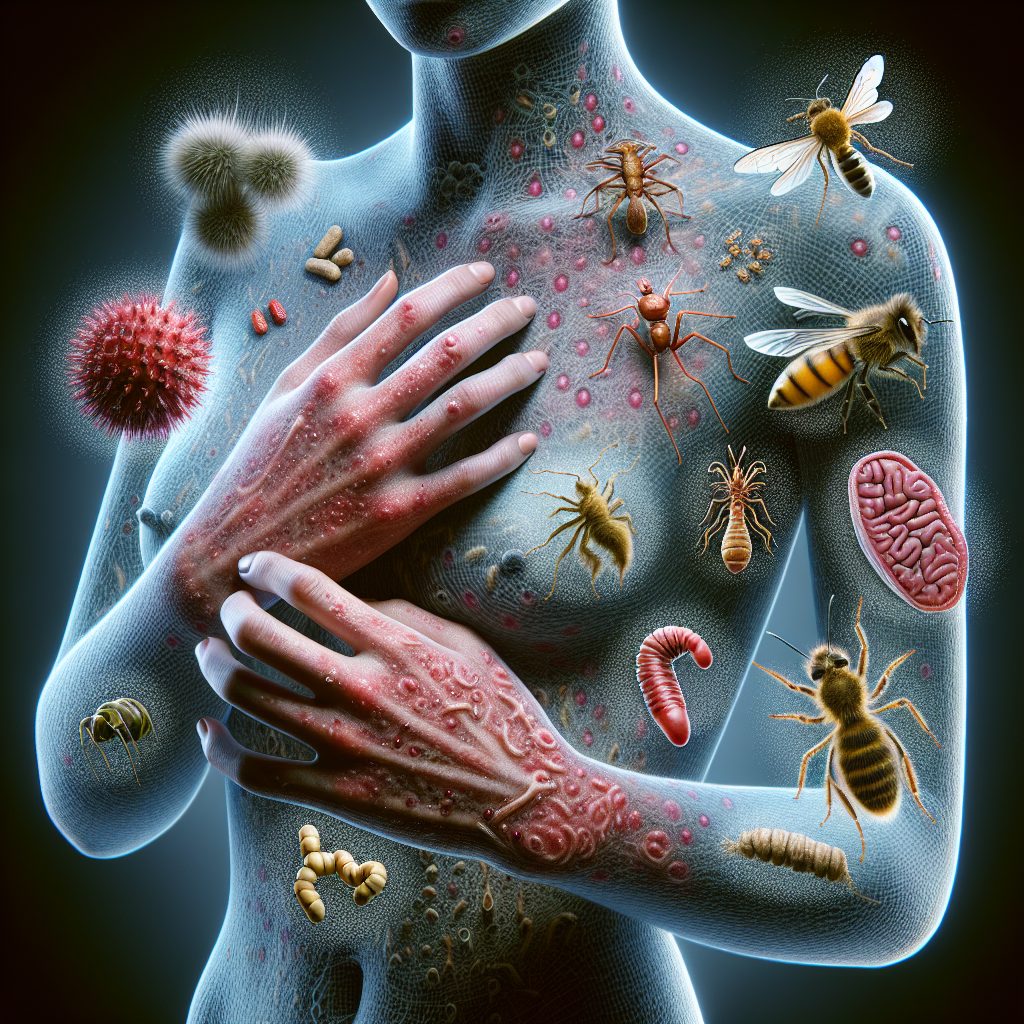
Allergens and skin irritations are the two biggest causes of skin and other related illnesses seen in modern day society. These same allergens and skin irritations can cause big problems for those with food allergies, skin sensitivities, and other health concerns. Allergens can be found in everyday activities such as gardening, cooking, and even brushing your teeth. These simple activities can cause an allergic reaction and skin irritations can occur when a person comes in contact with substances such as soap, detergent, and certain types of fabrics.
The different types of symptoms that can be seen with allergens and irritations vary greatly depending on the severity of the allergy, and the type of allergen in question. Common reactions from an allergen can range from mild itching and sneezing, to more severe reactions such as hives and anaphylaxis. Skin irritations can include dry, itchy rashes, lesions, redness, and bumps. It is vital everyone is taking preventative measures to reduce the exposure to these substances to avoid the risk of developing these illnesses. In the next section, we will touch on a few of the key takeaways that can help and reduce the chances of skin allergy and irritation.
Key Takeaways
1. Allergens and irritants are factors that can cause the skin to become dry, itchy, and inflamed.
2. Common allergens or irritants that can cause skin irritation include dust, pollen, animal dander, harsh chemical products, and certain cosmetics.
3. Skin protection involves avoiding contact with the allergens or irritants to reduce skin reactions.
4. Natural treatments, such as aloe vera gel, oats, yogurt, and honey, can be used to relieve the inflammation and itching associated with skin irritations.
5. Appropriate medications and hydrocortisone creams are recommended for severe skin irritations and for managing allergies.
What Causes Allergens and Skin Irritations?
Allergy reactions or irritations on the skin can be caused by a number of elements known as allergens. Common allergens include air-borne particles such as pollen, pet dander, and mold or dust mites. Skin irritation may also be caused directly by contact with certain substances such as latex, perfumes, and detergents or products such as laundry detergents, makeups, deodorants, or bath soaps.
How Do Allergens and Irritants Have an Impact on the Skin?
Allergens and irritants create an inflammatory response in the body, leading to redness, swelling, itchiness, and skin rashes. In certain cases, the reaction can involve multiple areas of the skin, resulting in blisters which can lead to further skin and breakouts.
What Are the Signs and Symptoms of Allergy reactions and Skin Irritations?
The most common signs of allergy reactions and skin irritations include itching, burning, redness, rash, hives, swelling, and blisters. In some cases, the hives or rash may be accompanied by a fever or difficulty breathing.
Which Treatments Are Available for Allergy Reactions and Skin Irritations?
Treatment for allergy reactions and skin irritations vary and depend on the specific allergen or irritant causing the reaction. Home remedies may include baking soda paste and OTC antihistamines, while prescription medications, such as topical corticosteroids, may be required for severe cases.
Tips for Managing Allergens and Skin Irritations:
1. Avoid or reduce exposure as much as possible to known allergens or irritants.
2. Use natural products with no fragrances or dyes to reduce irritation of sensitive skin.
3. Use mild, non-irritating detergents while laundering clothing, towels, and linens.
4. Read labels on cleaning, cosmetic, and body products to identify potential allergens.
5. Heed warnings from doctors and other healthcare professionals when it comes to product use.
6. Take medications as prescribed to reduce the symptoms of allergic reaction and skin inflammation.
7. Stay informed and update your allergies list so that you can identify symptoms quickly and seek appropriate medical attention if needed.
What Causes Allergens and Skin Irritations?
Allergens are generally caused by environmental or internal factors. External allergens present in the environment can include pollen, pet dander, cockroach droppings, dust, and certain chemicals. Internal allergens include things like certain foods and medications. Allergens cause a reaction when they come in contact with the skin, as the skin is the body’s first line of defense against elements that can cause irritation.
What are the Common Symptoms of Allergens and Skin Irritations?
Allergy and skin irritation symptoms are generally the same, and include: redness of the skin, itching, swelling, hives, and rashes. In extreme cases, the reaction can cause difficulty breathing, nausea, and dizziness. It is important to seek medical attention if any of these symptoms occur.
What Should be Done to Avoid Allergens and Skin Irritations?
In order to reduce the risk of allergy or skin irritation, it is important to take preventive measures. These can include avoiding areas that may contain allergens, and wearing protective clothing such as gloves, long-sleeved shirts, and pants when handling items that may cause reactions. It is also important to read labels on food and medications for potential allergens, and to take the recommended dosage.
Are Allergens and Skin Irritations Contagious?
No, allergens and skin irritations are not contagious. Allergic reactions are caused by the individual’s own body’s immune system reacting to an allergen when coming in contact with it. Skin irritations are caused by environmental factors, such as harsh chemicals or temperature changes.
What Treatment Options are Available for Allergens and Skin Irritations?
Treatment options for allergies and skin irritations vary depending on the severity of the reaction. Mild reactions can usually be treated with antihistamines, hydrocortisone creams, or avoiding the allergen that is causing the reaction. Severe allergens may require an EpiPen or other forms of medication. Additionally, allergies and skin irritations should be treated by a doctor or healthcare professional to get the most accurate and effective treatment available.
What is the Best Way to Test for Allergens and Skin Irritations?
The best way to test for allergies and skin irritations is to visit an allergist or doctor, who can properly evaluate a person’s individual reaction. The doctor can perform tests to determine what allergens are causing a reaction and provide the appropriate treatment.
What are the Common Myths about Allergens and Skin Irritations?
There are many myths circulating about allergies and skin irritations. One of the most common is that allergies are only caused by food or animals, when in fact, they can also be caused by environmental elements such as pollen and dust. Additionally, some people believe that all skin rashes and irritations are allergic reactions, when in fact, some can be caused by environmental factors such as severe weather conditions or harsh soaps.
What Foods Should be Avoided for Allergens and Skin Irritations?
Food allergies can cause reactions when a certain food comes in contact with the skin. People should avoid foods that they are known to be allergic to or that may contain allergens. It is important to read labels on food to determine potential allergens and contact a doctor if unsure.
How can a Person Manage Symptoms of Allergens and Skin Irritations?
The best way to manage symptoms of allergies and skin irritations is to avoid triggers and allergens when possible. Additionally, antihistamines and hydrocortisone creams can provide relief from itching and inflammation. If symptoms persist, it is important to contact a doctor and get the proper treatment for the situation.
Final Thought
Allergens and skin irritations can cause a range of uncomfortable and inconvenient symptoms. It is important to be aware of potential allergens and take the necessary steps to avoid them. Additionally, it is important to seek medical attention if symptoms become severe or persist for extended periods of time. Proper prevention and treatment can help reduce the impact of allergens and skin irritations.
It is also important to remember that the most effective way to test for and treat allergies and skin irritations is to speak directly with a doctor or healthcare professional. They can provide accurate guidance and treatment solutions to manage the symptoms and ensure the person’s comfort and safety.



